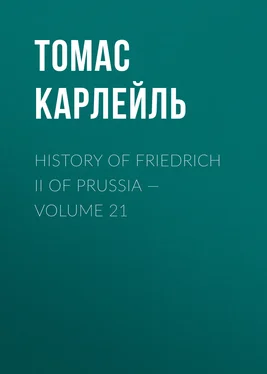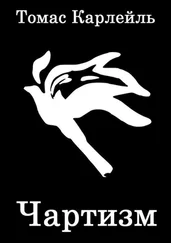Томас Карлейль - History of Friedrich II of Prussia — Volume 21
Здесь есть возможность читать онлайн «Томас Карлейль - History of Friedrich II of Prussia — Volume 21» — ознакомительный отрывок электронной книги совершенно бесплатно, а после прочтения отрывка купить полную версию. В некоторых случаях можно слушать аудио, скачать через торрент в формате fb2 и присутствует краткое содержание. Жанр: foreign_prose, История, literature_19, foreign_edu, foreign_antique, на английском языке. Описание произведения, (предисловие) а так же отзывы посетителей доступны на портале библиотеки ЛибКат.
- Название:History of Friedrich II of Prussia — Volume 21
- Автор:
- Жанр:
- Год:неизвестен
- ISBN:нет данных
- Рейтинг книги:3 / 5. Голосов: 1
-
Избранное:Добавить в избранное
- Отзывы:
-
Ваша оценка:
- 60
- 1
- 2
- 3
- 4
- 5
History of Friedrich II of Prussia — Volume 21: краткое содержание, описание и аннотация
Предлагаем к чтению аннотацию, описание, краткое содержание или предисловие (зависит от того, что написал сам автор книги «History of Friedrich II of Prussia — Volume 21»). Если вы не нашли необходимую информацию о книге — напишите в комментариях, мы постараемся отыскать её.
History of Friedrich II of Prussia — Volume 21 — читать онлайн ознакомительный отрывок
Ниже представлен текст книги, разбитый по страницам. Система сохранения места последней прочитанной страницы, позволяет с удобством читать онлайн бесплатно книгу «History of Friedrich II of Prussia — Volume 21», без необходимости каждый раз заново искать на чём Вы остановились. Поставьте закладку, и сможете в любой момент перейти на страницу, на которой закончили чтение.
Интервал:
Закладка:
"To form an idea of the general subversion," says the King, in regard to 1763, "and how great were the desolation and discouragement, you must represent to yourself Countries entirely ravaged, the very traces of the old habitations hardly discoverable; Towns, some ruined from top to bottom, others half destroyed by fire;—13,000 Houses, of which the very vestiges were gone. No field in seed; no grain for the food of the inhabitants; 60,000 horses needed, if there was to be ploughing carried on: in the Provinces generally Half a Million Population (500,000) less than in 1756,—that is to say, upon only Four Millions and a Half, the ninth man was wanting. Noble and Peasant had been pillaged, ransomed, foraged, eaten out by so many different Armies; nothing now left them but life and miserable rags.
"There was no credit, by trading people, even for the daily necessaries of life." And furthermore, what we were not prepared for, "No police in the Towns: to habits of equity and order had succeeded a vile greed of gain and an anarchic disorder. The Colleges of Justice and of Finance had, by these frequent invasions of so many enemies, been reduced to inaction:" no Judge, in many places not even a Tax-gatherer: the silence of the Laws had produced in the people a taste for license; boundless appetite for gain was their main rule of action: the noble, the merchant, the farmer, the laborer, raising emulously each the price of his commodity, seemed to endeavor only for their mutual ruin. Such, when the War ended, was the fatal spectacle over these Provinces, which had once been so flourishing: however pathetic the description may be, it will never approach the touching and sorrowful impression which the sight of it produced."
Friedrich found that it would never do to trust to the mere aid of Time in such circumstances: at the end of the Thirty-Years War, "Time" had, owing to absolute want of money, been the one recipe of the Great Elector in a similar case; and Time was then found to mean "about a hundred Years." Friedrich found that he must at once step in with active remedies, and on all hands strive to make the impossible possible. Luckily he had in readiness, as usual, the funds for an Eighth Campaign, had such been needed. Out of these moneys he proceeded to rebuild the Towns and Villages; "from the Corn-Stores (GRANARIES D'ABONDANCE," Government establishments gathered from plentiful harvests against scarce, according to old rule) "were taken the supplies for food of the people and sowing of the ground: the horses intended for the artillery, baggage and commissariat," 60,000 horses we have heard, "were distributed among those who had none, to be employed in tillage of the land. Silesia was discharged from all taxes for six months; Pommern and the Neumark for two years. A sum of about Three Million sterling [in THALERS 20,389,000] was given for relief of the Provinces, and as acquittance of the impositions the Enemy had wrung from them.
"Great as was this expense, it was necessary and indispensable. The condition of these Provinces after the Peace of Hubertsburg recalled what we know of them when the Peace of Munster closed the famous Thirty-Years War. On that occasion the State failed of help from want of means; which put it, out, of the Great Elector's power to assist his people: and what happened? That a whole century elapsed before his Successors could restore the Towns and Champaigns to what they were. This impressive example was admonitory to the King: that to repair the Public Calamities, assistance must be prompt and effective. Repeated gifts (LARGESSES) restored courage to the poor Husbandmen, who began to despair of their lot; by the helps given, hope in all classes sprang up anew: encouragement of labor produced activity; love of Country rose again with fresh life: in a word [within the second year in a markedly hopeful manner, and within seven years altogether], the fields were cultivated again, manufacturers had resumed their work; and the Police, once more in vigor, corrected by degrees the vices that had taken root during the time of anarchy." [ OEuvres de Frederic, vi. 74, 75.]
To Friedrich's difficulties, which were not inconsiderable, mark only this last additament: "During this War, the elder of the Councillors, and all the Ministers of the Grand Directorium [centre of Prussian Administration], had successively died: and in such time of trouble it had been impossible to replace them. The embarrassment was, To find persons capable of filling these different employments [some would have very soon done it, your Majesty; but their haste would not have tended to speed!]—We searched the Provinces (ON FOUILLA, sifted), where good heads were found as rare as in the Capital: at length five Chief Ministers were pitched upon,"—who prove to be tolerable, and even good. Three of them were, the VONS Blumenthal, Massow, Hagen, unknown to readers here: fourth and fifth were, the Von Wedell as War-Minister, once Dictator at Zullichan; and a Von der Horst, who had what we might partially call the Home Department, and who may by accident once or so be namable again.
Nor was War all, says the King: "accidental Fires in different places," while we struggled to repair the ravagings of War, "were of unexampled frequency, and did immense farther damage. From 1765 to 1769, here is the list of places burnt: In East Preussen, the City of Konigsberg twice over; in Silesia, the Towns of Freystadt, Ober-Glogau [do readers recollect Manteuffel of Foot and "WIR WOLLEN IHM WAS"!], Parchwitz, Naumburg-on-Queiss, and Goldberg; in the Mark, Nauen; in the Neumark, Calies and a part of Lansberg; in Pommern, Belgard and Tempelburg. These accidents required incessantly new expenditures to repair them."
Friedrich was not the least of a Free Trader, except where it suited him: and his continual subventions and donations, guidances, encouragements, commandings and prohibitions, wise supervision and impulsion,—are a thing I should like to hear an intelligent Mirabeau (Junior or Senior) discourse upon, after he had well studied them! For example: "ON RENDIT LES PRETRES UTILES, The Priests, Catholic Priests, were turned to use by obliging all the rich Abbeys to establish manufactures: here it was weavers making damasks and table-cloths; there oil-mills [oil from linseed]; or workers in copper, wire-drawers; as suited the localities and the natural products,—the flaxes and the metals, with water-power, markets, and so on." What a charming resuscitation of the rich Abbeys from their dormant condition!
I should like still better to explain how, in Lower Silesia, "we (ON) managed to increase the number of Husbandmen by 4,000 families. You will be surprised how it was possible to multiply to this extent the people living by Agriculture in a Country where already not a field was waste. The reason was this. Many Lords of Land, to increase their Domain, had imperceptibly appropriated to themselves the holdings (TERRES) of their vassals. Had this abuse been suffered to go on, in time a great"—But the commentary needed would be too lengthy; we will give only the result: "In the long-run, every Village would have had its Lord, but there would have been no tax-paying Farmers left." The Landlord, ruler of these Landless, might himself (as Majesty well knows) have been made to PAY, had that been all; but it was not. "To possess something; that is what makes the citizen attached to his Country; those who have no property, and have nothing to lose, what tie have they?" A weak one, in comparison!"All these things being represented to the Landlord Class, their own advantage made them consent to replace their Peasants on the old footing."...
"To make head against so many extraordinary demands," adds the King (looking over to a new Chapter, that of the MILITARY, which Department, to his eyes, was not less shockingly dilapidated than the CIVIL, and equally or more needed instant repair), "new resources had to be devised. For, besides what was needed for re-establishment of the Provinces, new Fortifications were necessary; and all our Cannon, E'VASES (worn too wide in the bore), needed to be refounded; which occasioned considerable new expense. This led us to improvement of the Excises,"—concerning which there will have to be a Section by itself.
Читать дальшеИнтервал:
Закладка:
Похожие книги на «History of Friedrich II of Prussia — Volume 21»
Представляем Вашему вниманию похожие книги на «History of Friedrich II of Prussia — Volume 21» списком для выбора. Мы отобрали схожую по названию и смыслу литературу в надежде предоставить читателям больше вариантов отыскать новые, интересные, ещё непрочитанные произведения.
Обсуждение, отзывы о книге «History of Friedrich II of Prussia — Volume 21» и просто собственные мнения читателей. Оставьте ваши комментарии, напишите, что Вы думаете о произведении, его смысле или главных героях. Укажите что конкретно понравилось, а что нет, и почему Вы так считаете.









